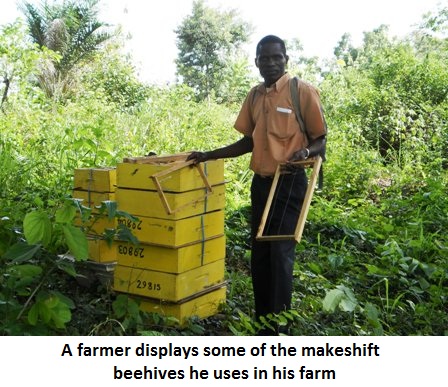 By Gift Friday
By Gift Friday
They are expected to sweeten the lives of Yambio County residents through the production of honey but, they are a dejected lot and are contemplating abandoning the activity altogether. Welcome to the world of Yambio County beekeepers whose work is being affected by a shortage of hives and packaging materials.

Most have no carpentry tools with which to make the wooden hives and even those who do manage to construct them face another dilemma – no bottles to store and market the honey.
Beekeeping is a major economic activity in Yambio County and residents are now calling on the government to help them improve production. The beekeepers have formed a beekeeping association to help them address the problems facing their operations but, lack of support from the government is slowing down their progress.
‘The People’s Voice’ visited the County recently and found the beekeepers in a crisis meeting, trying to chart out the future. One of the beekeepers is Emmanuel Enoka Sakondo, 35 and a father of six. He is the Chairman of Nangbimo beekeepers’ Association.
Sakondo commented, “We have chosen beekeeping as our main economic activity to improve our livelihood.” He added that beekeeping has helped to create more employment and reduce poverty in the County. However, he said lack of technical assistance was slowing the growth of the sub sector and cited the shortage of tools to make wooden hives and storage materials.
The farmer is full of praise for World Vision International who were supporting the local beekeepers. “World Vision has managed to support us in the training of personnel and on modern beekeeping. They have constructed a store and a honey processing center,” he said.
However, World Vision’s project was short-lived and many things remain to be done to help the beekeepers fulfill the full potential of their industry. Sakondo said that following World Vision’s pull out, farmers engaged in beekeeping plunged into troubles such as lack of transport and product labeling and packaging materials. “We have got our local manual honey extracting machine in our center but due to lack of bottling materials we only keep the processed honey in jerry cans,” he explained.
He said that Arab traders from North Sudan bought most of the locally produced honey while the rest is sold to Wau and other parts of South Sudan. The local association has about 27 beekeepers. “We could do more but due to poor infrastructure, we have only managed to produce a very little quantity in the past one and a half years,” Sakondo stated.
Amjima Santo, 27, one of the few female beekeepers expressed concern over lack of materials and technical support. “Beekeeping is one of the most profitable economic activities and we are asking the government to help modernize it,” she said.
Another beekeeper, Justin Kabash, 45, has been tapping honey for the past five years but has little to show for it because of lack of modern facilities. He said that although the business has helped him pay school fees for his three sons, he could have earned more if he had modern facilities to extract and store the honey. “We have all along used traditional methods to extract honey but there is a need to employ the most modern methods that include use of smoke boxes and full protective kits that enable extraction at any time of the day.
Hassan Bakit, one of the Arab business men who buys the honey from the Nangbimo beekeeping association, really appreciated the quality of the honey being produced by the local beekeepers. Hassan said that the honey is pure and good for health since it is being processed without additives. He encouraged the beekeepers to continue with their activity and to produce larger quantities that will allow them export it to other parts of the world. He also called for proper labeling of the product, saying it would help attract more buyers.